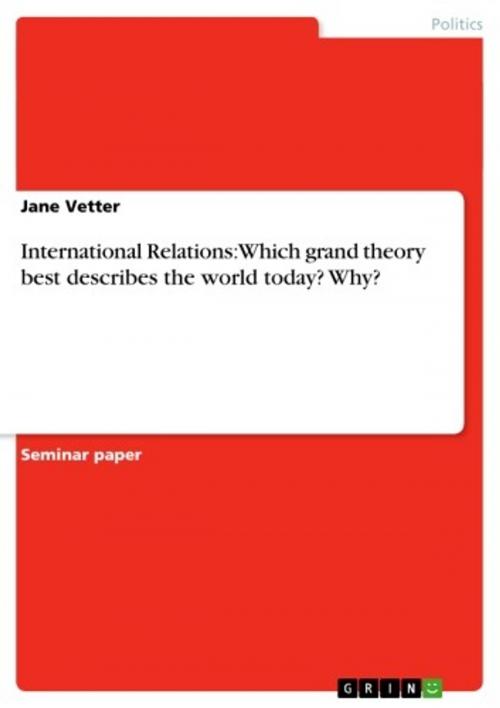International Relations: Which grand theory best describes the world today? Why?
Nonfiction, Social & Cultural Studies, Political Science, International, Foreign Legal Systems| Author: | Jane Vetter | ISBN: | 9783640186334 |
| Publisher: | GRIN Verlag | Publication: | October 13, 2008 |
| Imprint: | GRIN Verlag | Language: | English |
| Author: | Jane Vetter |
| ISBN: | 9783640186334 |
| Publisher: | GRIN Verlag |
| Publication: | October 13, 2008 |
| Imprint: | GRIN Verlag |
| Language: | English |
Seminar paper from the year 2007 in the subject Politics - Political Systems - General and Comparisons, University of North Florida, 2 entries in the bibliography, language: English, abstract: In international relations, we find many different actors with distinctive interests and certain individual instruments to realize goals. Within the following paper, our question cannot necessarily be how important nation-states are in comparison with international organizations such as the United Nations, for example. Instead, we have to find the best match in regard to outlining and observing today's political world. In the following, I will show that realism best describes our world today because of four striking reasons. First, realism is the easiest way to approach international politics and describing the world. Second, realism best applies to our daily individual lives and, therefore, dominates how we shape international relations. Third, the realist theory is our last resort when political circumstances get out of hand, and lives, sovereignty, and power are threatened. This is because we traditionally relied on realist approaches and, consequently, do not hesitate in further outlining our world with the help of realism since it makes us feel more secure in what we are doing. Fourth, realism marks today's hegemon, the United States, and, hence, today's world politics. This reasoning is not an attempt, however, to minimize other grand theories, liberalism and constructivism. International relations is a vast field and therefore must be complemented by alternative views in order to round out the picture and to arrive at valid and persuasive understandings of international politics.
Seminar paper from the year 2007 in the subject Politics - Political Systems - General and Comparisons, University of North Florida, 2 entries in the bibliography, language: English, abstract: In international relations, we find many different actors with distinctive interests and certain individual instruments to realize goals. Within the following paper, our question cannot necessarily be how important nation-states are in comparison with international organizations such as the United Nations, for example. Instead, we have to find the best match in regard to outlining and observing today's political world. In the following, I will show that realism best describes our world today because of four striking reasons. First, realism is the easiest way to approach international politics and describing the world. Second, realism best applies to our daily individual lives and, therefore, dominates how we shape international relations. Third, the realist theory is our last resort when political circumstances get out of hand, and lives, sovereignty, and power are threatened. This is because we traditionally relied on realist approaches and, consequently, do not hesitate in further outlining our world with the help of realism since it makes us feel more secure in what we are doing. Fourth, realism marks today's hegemon, the United States, and, hence, today's world politics. This reasoning is not an attempt, however, to minimize other grand theories, liberalism and constructivism. International relations is a vast field and therefore must be complemented by alternative views in order to round out the picture and to arrive at valid and persuasive understandings of international politics.















